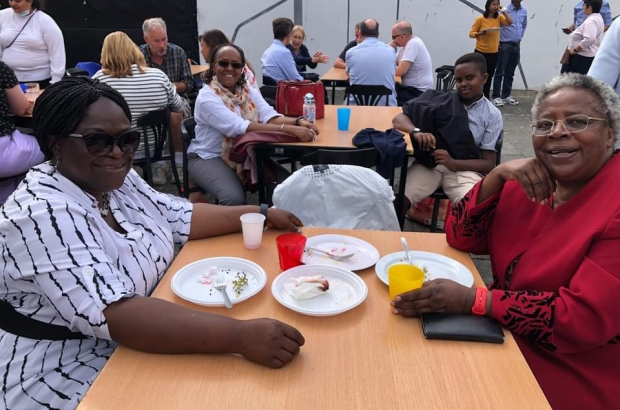- Daily & Weekly newsletters
- Buy & download The Bulletin
- Comment on our articles
Community life: Anglican chaplain Dominic Newstead reflects on challenges of ministering to international flock
When Dominic Newstead (pictured below) arrived at St Paul’s Tervuren during the Covid pandemic, he drew on 25 years’ experience leading inter-generational church in the UK and mainland Europe to overcome the challenges of confinement. The British-French national has a particular interest in the Great Lakes region of Africa and as a father of four, he loves to get involved in youth projects.
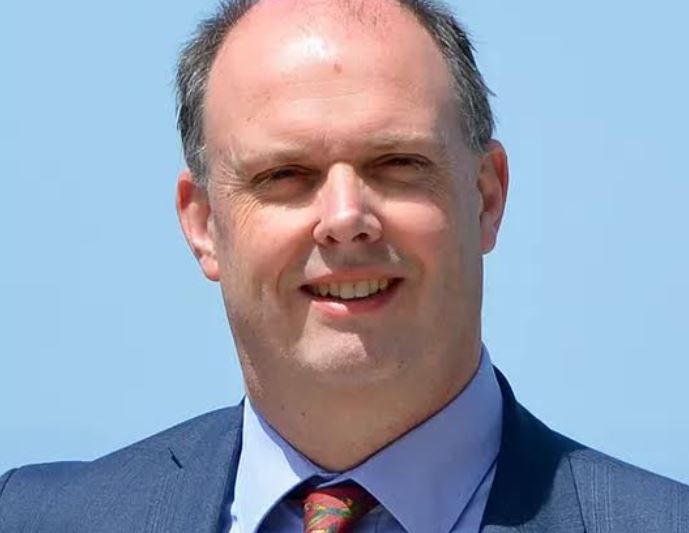
How did you and your family adapt to life in Belgium?
It was quite challenging because not all of us could move here, so we had a bit of adjustment in our family life in the early months. Clearly, we weren’t able to gather together as a church because of the restrictions, which was very sad. The hardest thing has been ministering to people who I have not always been able to meet in person to chat about their hopes and dreams. It’s very different talking to someone by Zoom. Like a lot of expat communities, where support networks are not nearby, people are having to build a network at a time when they’re isolated from the people they know and love. Church life is about gathering people together, so that’s meant learning different ways in which we can try and get to know people and be there for one and another.
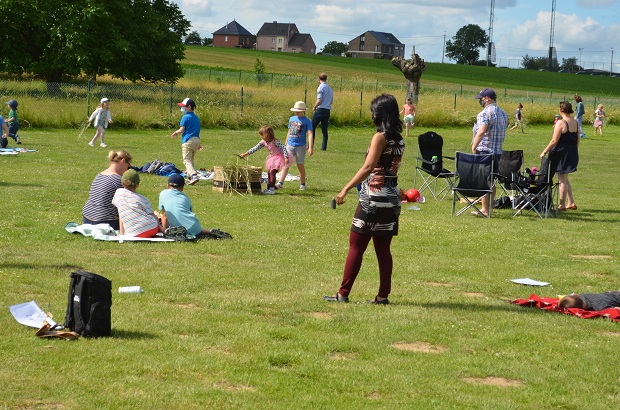
How has St Paul’s adapted its activities over the past 18 months?
We’ve had to explore online tools, particularly with our children and young people. We’ve invested in technology to livestream services to make sure that isolated people, especially older folk, have something to be part of. As a church, we fall under the umbrella of the Anglican central committee, so there’s lots of protocols that have to be formally approved by the ministry of justice. We’ve had some fantastic activities like our carol service at Christmas. A team worked together to do something digitally; different choirs at different events, gathering five people at a time. We also said that we’ll live with the pain of not doing some of the things we want to do, but we’ll find new things to do and we’ve done as much as we can to connect to people. Our mums and tots group has grown in the pandemic because newly-arrived people were not able to meet other others.
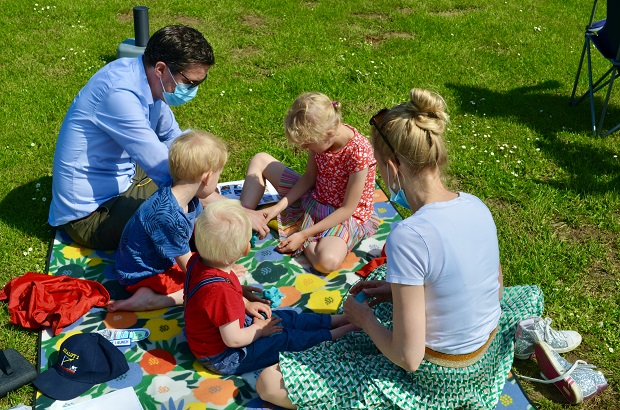
We’ve gathered for services at Tervuren park on Sundays. We were very visible and people stopped and were interested because of the number of children we had. Churches are not only for older people. We have a wide age range in our community, with many of our teenagers in different local and international schools. We’d send them off in groups of 10 to walk around the park just so they could meet together. There’s a significant number of older people on their own, so we’ve had evening events over the summer with 20 to 30 people coming along. Some of our older folk who haven’t seen their grandchildren, love being around some of the families with young children and have been invited for lunch. The importance of building an inter-generational community of faith is something that I’ve learned over time and is the DNA of our church.
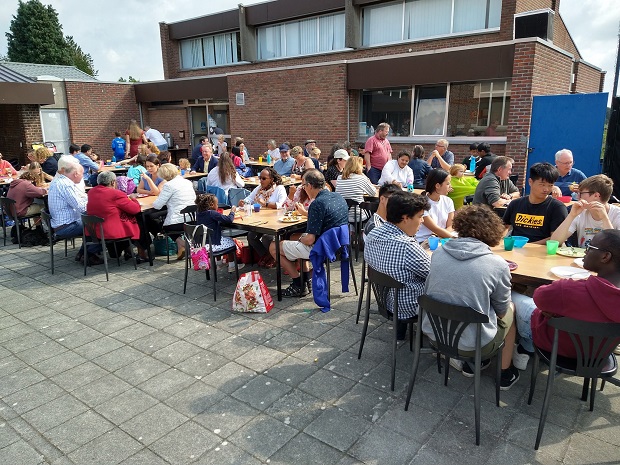
Some families here have been separated for months by Covid and we’re aware of how other people in our community are experiencing it. One member of our church was an ambassador from a Caribbean country and in an interview before she returned home, she asked us to pray for justice in the distribution of vaccines so that poorer countries could be given an equal right of access. It’s challenging because it confronts you with your own selfishness and makes you think about how your faith is making a difference. It’s great to be in a church where you have those different voices saying this is what it’s like in our country.
How are you planning events for the autumn?
We’re using a church building in Duisberg and we hope to continue with services in the park at St Hubertus. We’ve got different events, some in the church, which is a more traditional expression of gathering to worship, but we’ll also be having some services in a restaurant, which we can do inside. We’re grateful that the church regulations are linked to the Horeca sector. We’re focusing on things that will bring real value to people and enjoy doing that to the very best of our ability. As we have a church centre, we’d like it to be a hub for the community where people can gather. It doesn’t have to be a British club or anything to do with the church. It’s important that we ask what are the community’s need and how can we meet them.
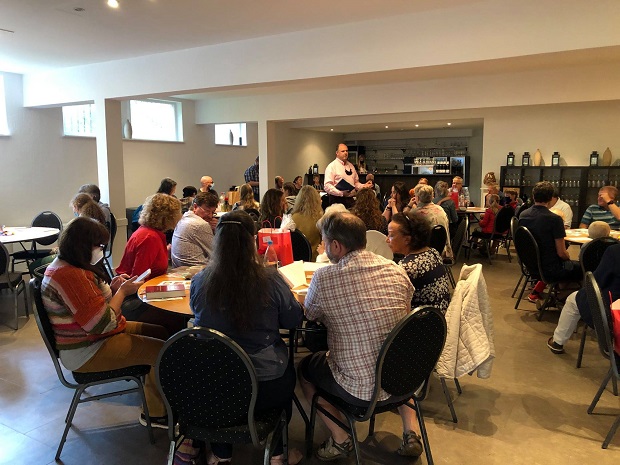
How would you define the church community Tervuren?
It’s changed over time. If you go back 20 plus years, it was predominantly English-speaking and families with their children at the British School of Brussels. It’s a real delight now to see a lot of families, what the French call the ‘foyers mixtes’, with people from different nationalities (Europe, Asia, Africa and both North and South America) who want to be part of an English-speaking church and community. That brings a real richness and gives us insight into different communities’ experience of what it means to live internationally. Some come from poorer countries, with families at home who can’t isolate in a different bedroom because the family all have shared rooms. We’ve had to be very aware that even in our privileged community of Tervuren, not everybody comes with the kind of support and the financial ability to be able to travel and support family at home. We’ve also found ways in which we can help with some local charities. We’ve supported Oasis on a project working with trafficked people in Belgium and we support the Protestant Social Centre and Serve the City, preparing meals and caring for people with real needs. In the run up to Christmas, remembering that Jesus was born in poverty and was himself a refugee, with help from the scouts and the school parents, we used our empty building to gather food and gifts, which went through the social services in Tervuren and Brussels to families for whom life is a real struggle and have a shortage of food.
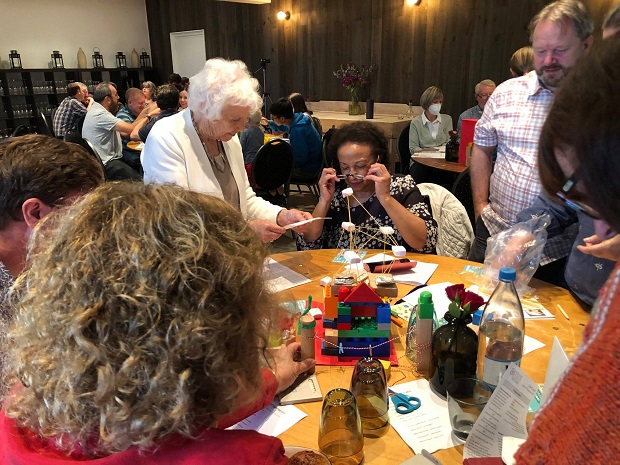
What has been your previous work in the UK and abroad?
I’ve had 15 years ministry in churches that meet in schools, not in established churches, building a faith community without a permanent physical building. We did that in Fontainebleau, south of Paris, where our children were born in the early 2000s. We did a similar thing in Liverpool where we worked in a church that met in a school on the edge of Birkenhead that had real social deprivation. I was in a regular English parish near St Albans just before coming here, but much of my time has been in those communities where there’s no real visible presence. The focus has been on bringing value to the community. In the UK, we’d meet with people once a week in the pub, just saying, do you have any questions about life or faith, come and chat?
How has being Anglo-French altered your perspective on international life?
I think it’s been really important for us as a family identifying as European and growing up with two cultures, particularly when we were in Fontainebleau, working with teenagers who will become what is known as third culture kids. You see that children who are growing up with these multiple cultures are never quite sure where they belong. Having experienced that myself, of being too English when I’m in France and too French when I’m in England and not quite knowing where you fit in. It’s certainly informed a lot of my work, particularly with youngsters who are exploring who they are themselves. It can be an instability but also a richness that allows them to not be in a culture where you have to accept absolutely everything at the expense of everything else. I know my children were really struggling with Brexit and what it means to be British because they have lived overseas.
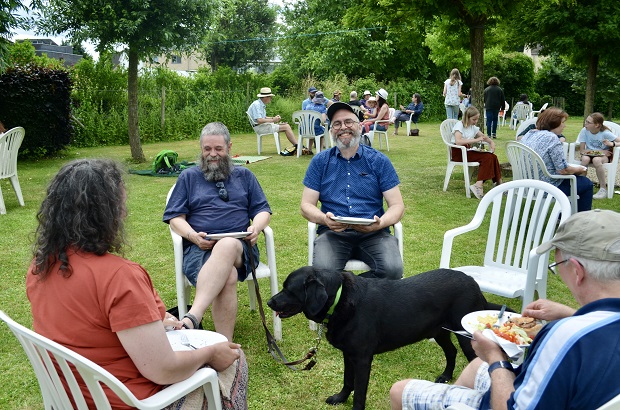
How did you become involved with missions in East Africa?
A college friend told me that some countries needed people who can speak French because there were lots of people going to Uganda, Tanzania and Kenya, but not Burundi, Congo and Rwanda. So my wife Annie and I went in the early 1990s and we spent a summer in Burundi working for the church. I suppose we fell in love a little with the region. I ended up on the Council of Rwanda Mission as it was known then and we did some short-term youth and educational work. I also led a team shortly after the genocide doing some rebuilding work amongst the churches there. Of course, it marks you and I maintain links with the country and some of the Rwandan community here. It’s seen some really difficult and harrowing times, but when things are at their darkest it’s also when you see hope and light, bravery and goodness. It’s not stable, particularly in that eastern part of Congo that is so rich in minerals, which are often smuggled and go into our smartphones and many things that we buy, totally unaware. But the people are just gracious and lovely and welcoming. It makes us realise how privileged we are and helps bring a perspective to what is important in life and helps me to be on an even keel. It’s very easy to be drawn into a community like Tervuren and all that is available to us here in Belgium. There are bigger questions such as having a third vaccine, or, as the EU is beginning to do, say that we need to be sending vaccines to the global south. We need to be finding solutions that are whole world solutions, not those that are just good for us.
Are youth projects a continuing priority?
Children’s work is really important to us as part of caring for the whole family. I love working with teenagers, they’re a delight and they love the fact that you’re giving your time for them. I love seeing children grow, take on leadership and develop, it’s the best thing. I think holiday clubs and children’s outreach are so good for building multi- and inter-generational relationships. A couple of years ago, the Sunday Times researched what factors linked the best graduates going into the FTSE 100 companies and were slightly shocked to discover that one factor for top candidates was being involved in a church in their teenage years. In our society, we’re often in our own peer groups. Where are the places where different generations spend time together and relate well? If you do that in your teen years, it’s so much easier to relate to senior colleagues and bosses.
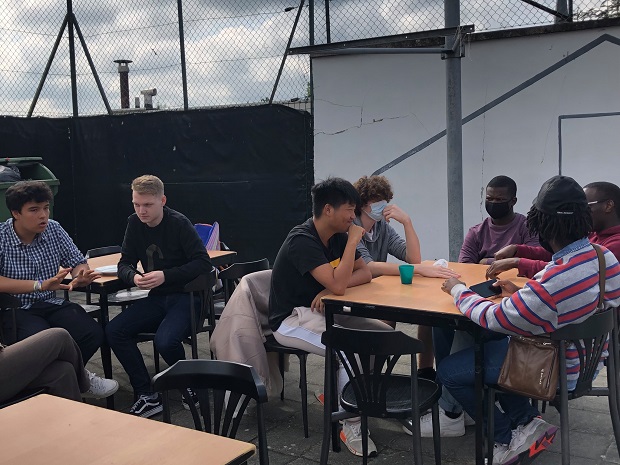
One of the things I organised in the UK was to gather year 9 (aged 13) schoolchildren to talk about genocide with a survivor of the Belsen WW2 concentration camp. We would draw parallels between what happened in Nazi Germany and what happened in Rwanda, looking at dehumanisation and the use of the media, and it was scary when looking at parallels with fake news and some of what we have seen in recent elections around the world. It was really valuable working with these youngsters and helping them to grasp that if they learned something, they could began to reflect on it and would help them with who they were. It’s not necessarily about having a faith, it’s about learning self-reflection skills and not seeing problems separate from their involvement in the world. At the heart of the Christian faith is Jesus’ teaching about love as opposed to hate. The fight against climate change and Black Lives Matters are great examples of applying this to real issues. That’s my training as a preacher, I’m not just trying to convey factual information, I can’t determine the outcome for a congregation, but I can guide them through the process of thinking, reflecting and wondering, which I think is great in terms of how this story can be retold.
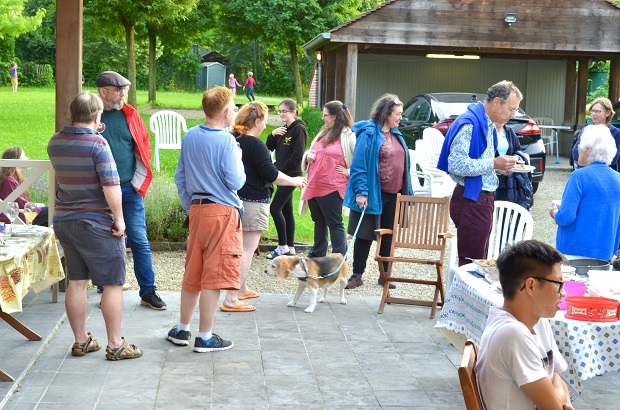
Are there any lessons you can draw from the Covid experience?
One good thing is that it has encouraged people to be much more open about how they’re doing. We’ve seen that with Black Lives Matters, where they’ve just turned around and said you know what, this is not good. We’ve seen with mental health where people are saying, it’s ok to talk about it. In a community like Tervuren where so many people are successful, talking about the things we struggle with or can’t do, is almost taboo. In the past 12 to 18 months, we’ve seen a lot of people talking about how the really are, for example Simone Biles in the Olympics, that has brought awareness to new groups of people. It’s good for teenagers to say, I’m not doing ok and there are days when I feel like crying and for that to not be a boy or girl thing. It helps us as a community to understand how hard it is at times and to acknowledge that we can still be competent, but also carry weakness and fragility. It’s ok for people to let their hearts out a bit and lower the barriers of professionalism and say, I can still be really good at what I do and I’ll be even better if you understand what some of my struggles are. It’s important that honesty doesn’t get lost when we go back to whatever the new normal is. We don’t want to get back to a position where people just plummet because they’ve kept it all in or had no-one to talk to.











